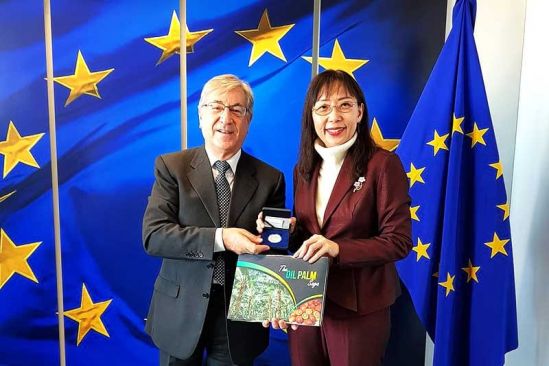Malaysia has agreed to nominate experts to sit in the European Commission’s Expert Panel on Indirect Land Use Change (ILUC) that could impact future use of palm oil as part of the biofuel mix within the European Renewable Energy Directive (RED) II.
Minister of Primary Industries, Teresa Kok, welcomes this initiative from the European Commission which will allow cross consultation with palm oil producers, including Malaysian palm oil experts on various key scientific principles under ILUC.
“This consultation process is important as we do not want our palm oil commodity to be discriminated upon,” said Kok who is leading a palm oil mission in Switzerland, Spain and Belgium.
She is accompanied by officials from the ministry, Malaysian Palm Oil Board, Malaysian Palm Oil Council, Malaysian Palm Oil Certification Council and Forest Research Institute of Malaysia.
The delegation held meetings with Karmenu Vella, the European Commissioner for Environment, Maritime Affairs and Fisheries, director-general for Environment, Education, Transport and Energy of the Council of the European Union, Dr. Jaroslaw Pietras, and managing director (Asia Pacific) of the European External Action Services, Gunnar Wiegand.
ILUC is generally not supported by industry and academic experts since the principles upon which it is based is fraught with unproven assumptions.
Indeed, the very basis of defining the concept of ILUC has not been universally verified, even within the EU. Malaysia’s concern is that this could determine the future use of palm oil as part of the EU’s RED II mandate despite the uncertainty surrounding ILUC.
“An expert panel from the European Commission will be visiting Malaysia at the end of this month to hold discussions with Malaysian experts on these issues and our experts will sit in the panel,” added Kok.
The Minister also stressed that it was extremely important for the EU Expert Panel to get a firsthand account of Malaysian palm oil cultivation and processing practices so that they appreciate the complexity of various operations that we execute to produce sustainable palm oil.
The move, she said, was positive in light of concerns that EU might use ILUC criteria to justify phasing out or restricting palm oil in the RED II mandate.
“Malaysia is willing to listen and actively participate in any debate on ILUC, however, we stress that this should not be lopsided against palm oil and even other crops.
“If the criteria that defines ILUC are not based on well-accepted scientific principles, Malaysia will use various international fora and trade negotiations to secure a just outcome for our palm oil exports,” she added.
Earlier in Madrid, Spain, Kok met Indonesian Trade Minister Enggartiasto Lukita to discuss the challenges facing palm oil in Europe.
Both parties feel that many of these actions, including the “No Palm Oil” labels on products, are discriminatory.
Therefore, Malaysia and Indonesia, as producer nations that depend on palm oil for a healthy GDP, agree in principle to collaborate in defending palm oil’s interest and overcome the prevailing misconceptions surrounding the commodity export.
“As founding members of the Council of Palm Oil Producing Countries (CPOPC), we aim to strengthen CPOPC membership by enrolling other palm oil producers, and use this international council to address the challenges in Europe,’ she said.
Kok stressed that the Malaysian Government will continue to engage and dialogue with the various institutions in the EU to address concerns on palm oil.







